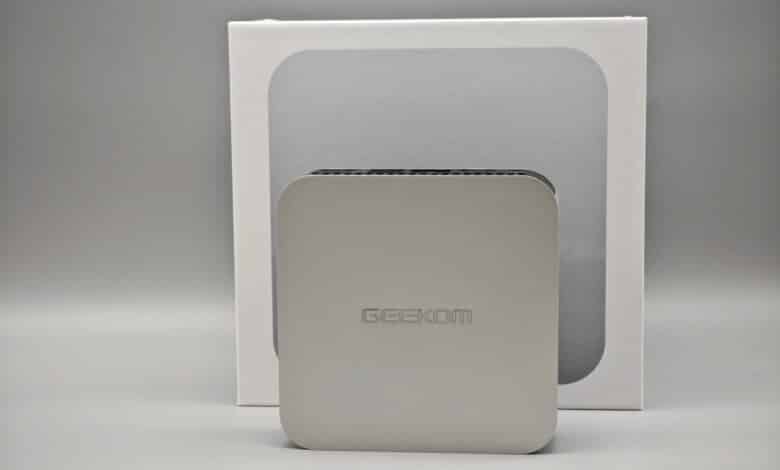
It has only been three months since Geekom conquered the Mini PC throne with the A7 in our test. Now the Geekom A8 is the successor, which is based on the modern AMD Ryzen 9 8945HS from the Hawk Point series, but is otherwise almost identical to its predecessor. In our Geekom A8 test, we see that the new CPU does not deliver any performance advantages, which is why the cheaper predecessor might be the better choice.
Technical data
| Product designation | A8 |
| Processor | AMD Ryzen 9 8945HS (8 cores, 16 threads, 4.0 – 5.2 GHz) |
| Graphics performance | AMD Radeon 780M |
| Dimensions (H x W x D) | 37 mm x 112 mm x 112 mm |
| Weight | 417 grams |
| Storage space | 2.000 GB SSD M.2 2280 (PCI e Gen4 x4) |
| Memory | 32 GB DDR5-5600 |
| Video | 2x HDMI 2.0, 2x USB-C up to 8K resolution |
| Operating system | Windows 11 Pro |
| Connectivity | Wi-Fi 6E, 2.5 Gigabit Ethernet |
| Ports | 2x USB 3.2 Gen 2 Type A; 1x USB 2.0; 1x USB4 Type-C; 1x USB 3.2 Gen 2 Type-C 1x 3.5 mm jack; 2x HDMI 2.0; 1x 2.5 Gbit/s Ethernet LAN |
| The price | € 949.00 * |
Geekom A8 Review: design and workmanship
- high-quality, compact design
- excellent workmanship
- good maintenance options
Unsurprisingly, the design of the A8 is identical to its predecessor, the Geekom A7. Once again, the manufacturer has opted for a silver aluminum housing, which is pleasantly compact at 112.4 mm x 112.4 mm x 37 mm.
In fact, alongside its predecessor, it is one of the handiest and lightest mini PCs ever. The build quality is also top, with absolutely nothing to complain about.
The maintenance options have also been carried over from the predecessor. Under the four glued rubber feet on the underside, cross-head screws are used to access the interior, where the RAM and SSD can be replaced.
The Geekom A8 can be equipped with up to 64 GB of RAM and accommodates an M.2 2280 SSD. The WLAN module in the M.2 2230 form factor can also be removed.
Features and connections
- modern CPU
- powerful iGPU
- convincing variety of connections
The most important and actually the only new feature of the Geekom A8 is the CPU. Instead of the AMD Ryzen 9 7940HS, the newer counterpart from the Hawk Point HS series, namely the AMD Ryzen 9 8945HS, is now used.
This is identical to its predecessor, but offers a higher clock rate for the Ryzen AI Engine, which results in significantly increased AI performance. Those who do not use AI applications locally on the mini PC will not notice any increase in performance.
Otherwise, the CPU is absolutely identical with 8 cores, 16 threads and clock rates between 4.0 GHz and 5.2 GHz. 8 MB L2 cache and 16 MB L3 cache are offered, Geekom does not exhaust the maximum possible TDP of 54 watts and leaves the A8 at 45 watts.
The integrated GPU in the form of the Radeon 780M with 12 CUs and up to 2.8 GHz is also identical. There is also 42 GB of DDR5-5600 RAM and a 2 terabyte SSD (Acer N500).
Wi-Fi6E and Bluetooth 5.3 round off the equipment here too, while Windows 11 Pro is used as the operating system.
The connections are also identical to the Geekom A7. There are two USB 3.2 Gen 2 Type-A ports at the front, as well as a 3.5 mm jack connection, and there is an SD 4.0 card reader on the side. The following ports are available at the rear:
- 2x HDMI 2.0
- 1x USB 4 Type-C
- 1x USB 3.2 Gen 2 Type-C
- 1x USB 3.2 Gen 2 Type-A
- 1x USB 2.0 Type-A
- 1x 2.5 Gbit Ethernet LAN
- 1x power connection
Practical test of the Geekom A8
- very good system performance
- somewhat quieter fan
- strong performance drops in games
Of course, the Geekom A8 also performs very well in practice. We are already used to this from the manufacturer’s mini PCs. In line with the components installed, the computing dwarf delivers an excellent working speed and is up to even the most demanding scenarios.
Compared to the A7, the fans on the new model are slightly quieter and take a little longer to start up. Under full load, they achieve a slightly lower noise level than the predecessor at 34 dB(A).
However, a direct comparison shows that the Geekom A8 cannot maintain performance as well as its predecessor. In the 3DMark Speed Way Stress test, the mini PC only achieved a frame rate stability of 65.2 percent and was therefore unable to pass the test.
This is partly due to the very high temperatures generated inside the compact computer. The GPU reaches temperatures of 80-90 degrees Celsius relatively quickly, while the CPU settles at around 70°C.
This already gives an idea of where the journey will take us in terms of performance, especially in the gaming sector. Apart from that, however, I didn’t notice any loss of performance, even during demanding multi-tasking tasks.
Benchmark: Productivity, system, SSD and gaming
As always, I took a closer look at the performance of the Geekom A8 in various benchmarks. I measured the productivity and system performance with PCMark 10 and Cinebench R23.
PCMark 10 simulates different workflows when running the benchmark, including word processing, surfing the Internet and spreadsheets. Cinebench, on the other hand, measures the speed of the CPU cores individually and in multi-core mode. In the gaming test, I tried out a few games in addition to 3DMark.
In the SSD benchmark, the Acer N5000 SSD achieves very good results and is even ahead of the identical Geekom A7 model in terms of performance, both in the short 1 GB test and the 10 GB endurance test.
3.911.58 MB/s read and 3,127.29 MB/s write are really impressive, while the 4K-64 Thrd values in particular benefit from the newer CPU. In the end, the total score of 5,934 points is a really good result.
| Read | Writing | |
| Sequential | 3.911.58 MB/s | 3.127.29 MB/s |
| 4K | 54.38 MB/s | 192.30 MB/s |
| 4K-64Thrd | 1.552.25 MB/s | 2.443.88 MB/s |
| Access time | 0.021 ms | 0.071 ms |
The AMD Ryzen 9 8945HS can show off its strengths in the Cinebench CPU tests and, somewhat surprisingly, sometimes lands well ahead of the predecessor model despite having the same features. This applies above all to the multi-core tests, while both Ryzen 9 generations are roughly on a par in terms of single-core performance.
In Cinebench 2024, the new generation achieved 932 points in the multi-core test, while the predecessor scored 872 points. In Cinebench R23, the difference is even more pronounced with 15,963 points compared to 14,615 points.
The Geekom A8 is also ahead in the comprehensive PCMark test, albeit only just. Surprisingly, however, it is slightly outperformed in the demanding area of digital content creation.
| Benchmark | Results |
| Cinebench R23 Multi Core | 15.963 pts. |
| Cinebench R23 Single Core | 1.803 pts. |
| Cinebench 2024 Multi Core | 932 pts. |
| Cinebench 2024 Single Core | 109 pts. |
| PCMark 10 total score | 7.593 pts. |
| PCMark 10 Essentials | 11.469 pts. |
| PCMark 10 Productivity | 10.656 pts. |
| PCMark 10 Digital Content Creation | 9.718 pts. |
| Geekbench 6 Multi Core | 13.043 pts. |
| Geekbench 6 Single Core | 2.651 pts. |
| Geekbench 6 GPU | 33.632 pts. |
What was already indicated in the practical test was also confirmed in the graphics and gaming tests. The Geekom A8 has massive problems maintaining the performance offered in the long term. This drops relatively quickly, which leads to lower results across the board than was the case with the A7.
While I had praised the good gaming suitability of the mini PC with Radeon 780M in the test at the time, I cannot recommend the new model here. Both the performance in the synthetic tests and in real games is significantly below what was to be expected.
| Benchmark | Results |
| Fire Strike Total | 6.316 points |
| Time Spy Total | 3.066 pts. |
| Speed Way Total | 442 points |
| Port Royal Total | 1.542 pts. |
| Solar Bay Total | 11.242 pts. |
| Final Fantasy XV (1080p; Standard Quality) | 3.032 pts. |
| F1 22 (1080p; High; Raytracing low) | 39 FPS |
| Shadow of the Tomb Raider (1080p; Medium) | 33 FPS |
The gaming performance of the A8 is of course still impressive, no question. However, it lags far behind the same GPU of the A7, which makes the new (and currently even more expensive) mini PC quite unattractive. Especially when you consider that the performance in other areas is almost identical.
Geekom A8 Review: Conclusion
The Geekom A8 disappoints in the test, albeit at a high level. This is mainly due to the fact that its predecessor achieved outstanding results across the board a good three months ago and was even able to achieve our Platinum Award.
In terms of design, workmanship and connectivity, the new edition is on a par, while the fans are even a little quieter. But not better, because the performance of the mini PC drops unusually quickly and so rapidly that the computing dwarf is virtually unsuitable for gaming.
Which is a shame, because the CPU and GPU are actually capable of running even the latest titles smoothly at high resolutions and settings. Unfortunately, the A8 runs out of breath very quickly because the performance has to be reduced to keep the high temperatures in check.
Unfortunately, there are hardly any reasons to choose the Geekom A8. If you are looking for a high-performance mini PC, the predecessor in the form of the A7 is a much better choice. If you are looking for an inexpensive computing dwarf for office tasks, you will be better served by other models and save a lot of money to boot.
Geekom A8
Design & Workmanship
Features
Performance: System
Leistung: Gaming
Value For Money
86/100
High-quality mini PC with strong equipment and many connections, but with clear deficits in performance and therefore does not live up to the high price.

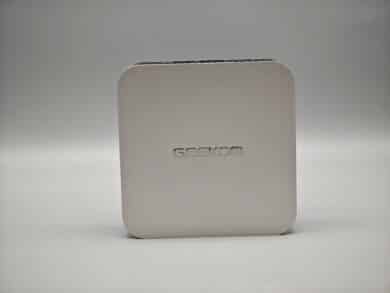
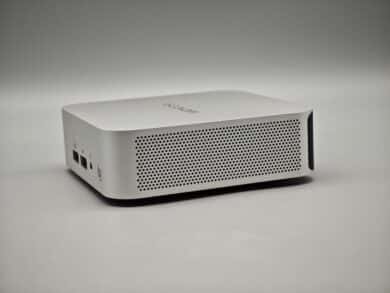
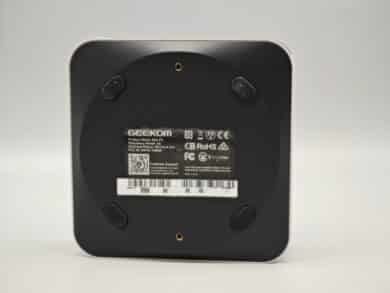
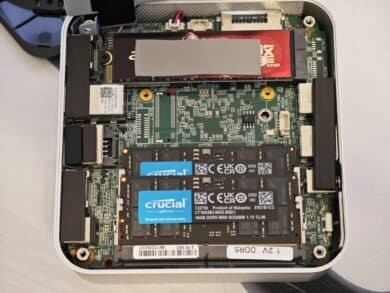
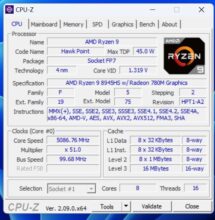
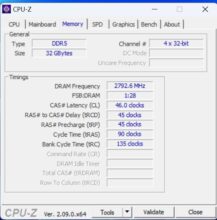
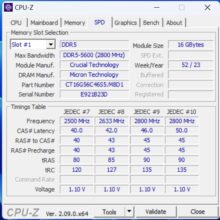
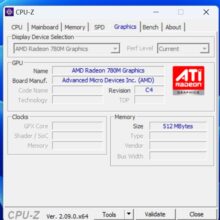
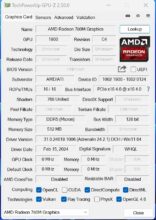
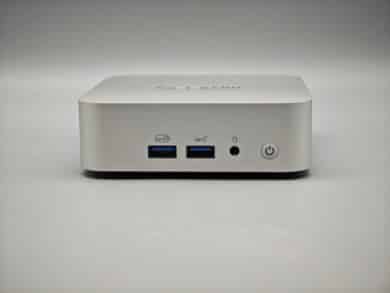
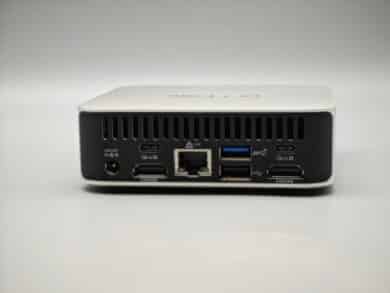
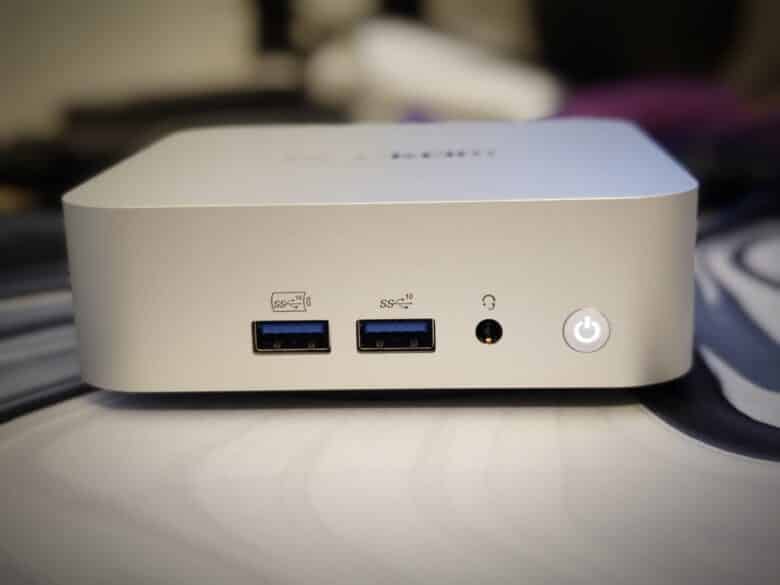
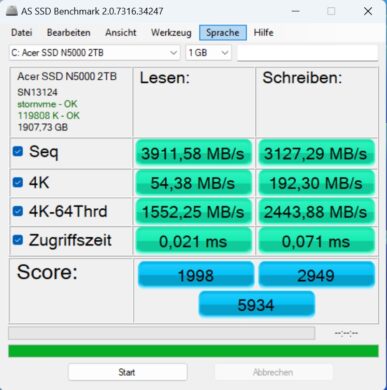
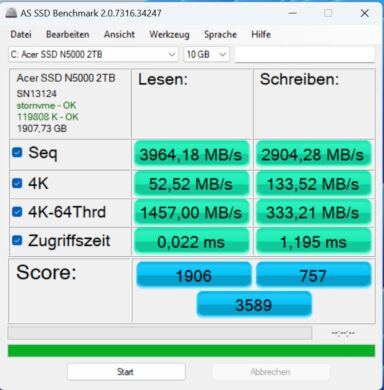
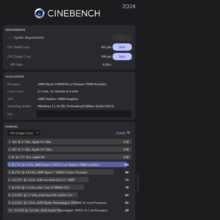
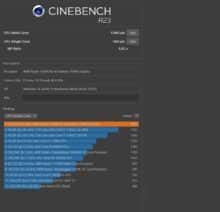
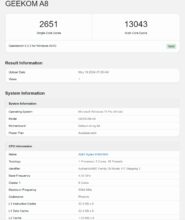
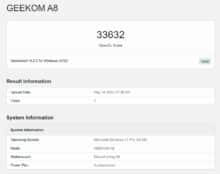
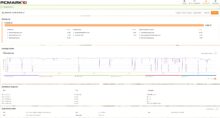
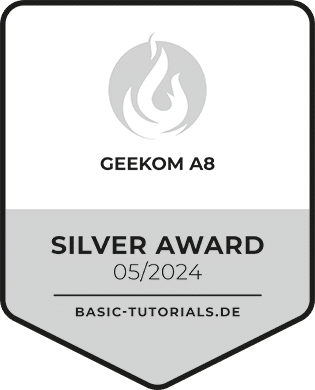
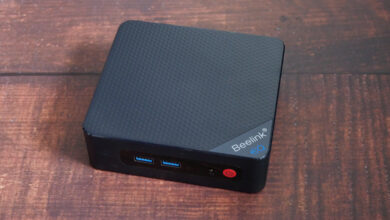
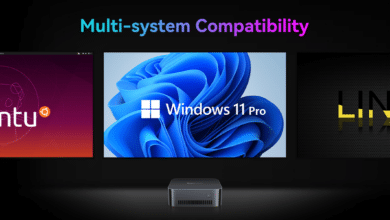
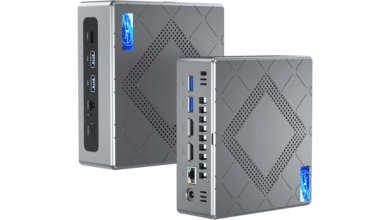
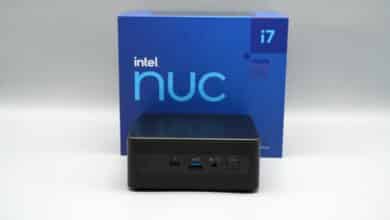
No replies yet
Neue Antworten laden...
Gehört zum Inventar
Beteilige dich an der Diskussion in der Basic Tutorials Community →